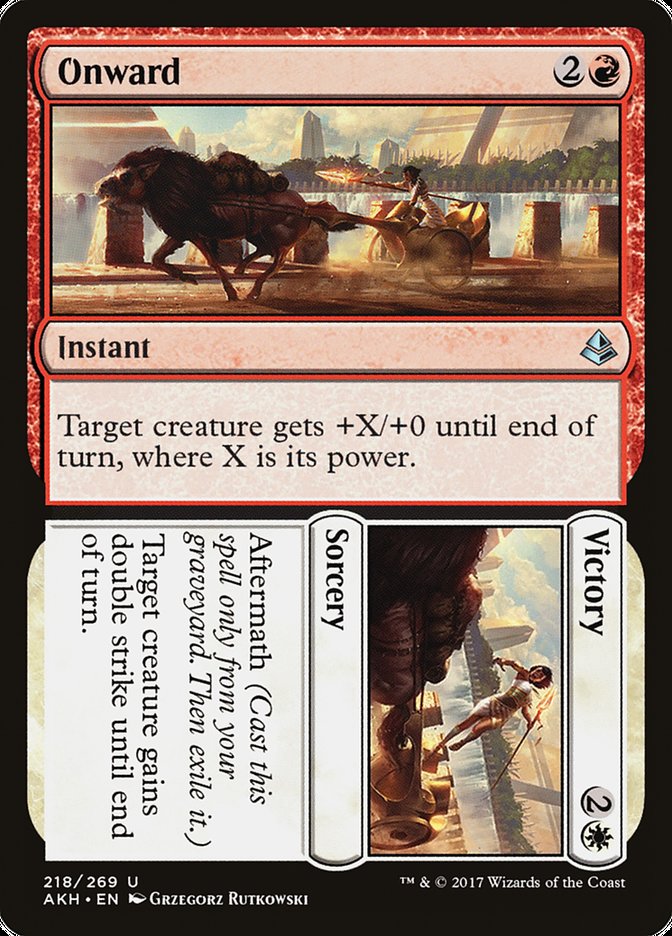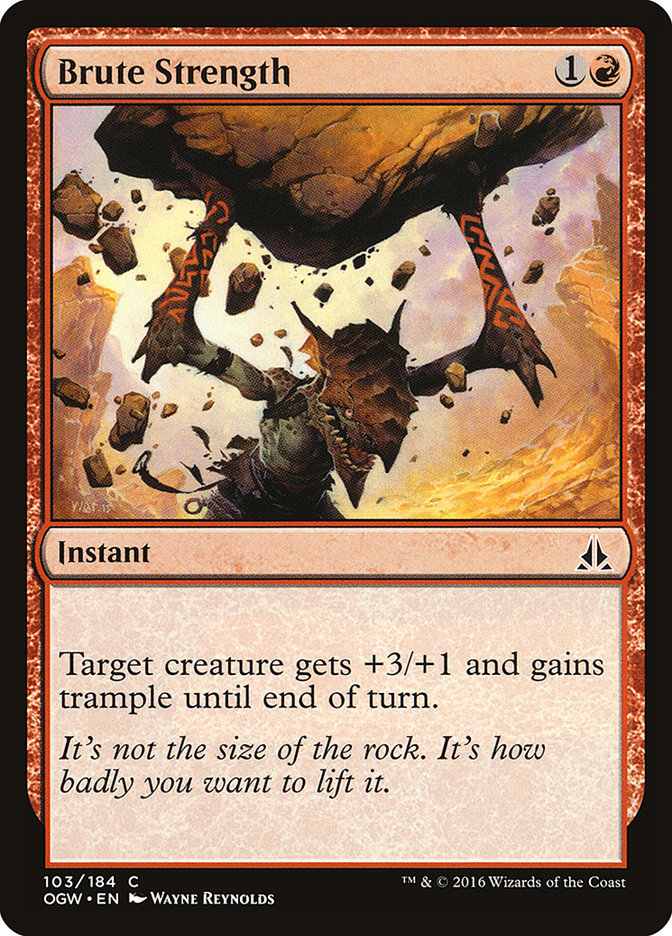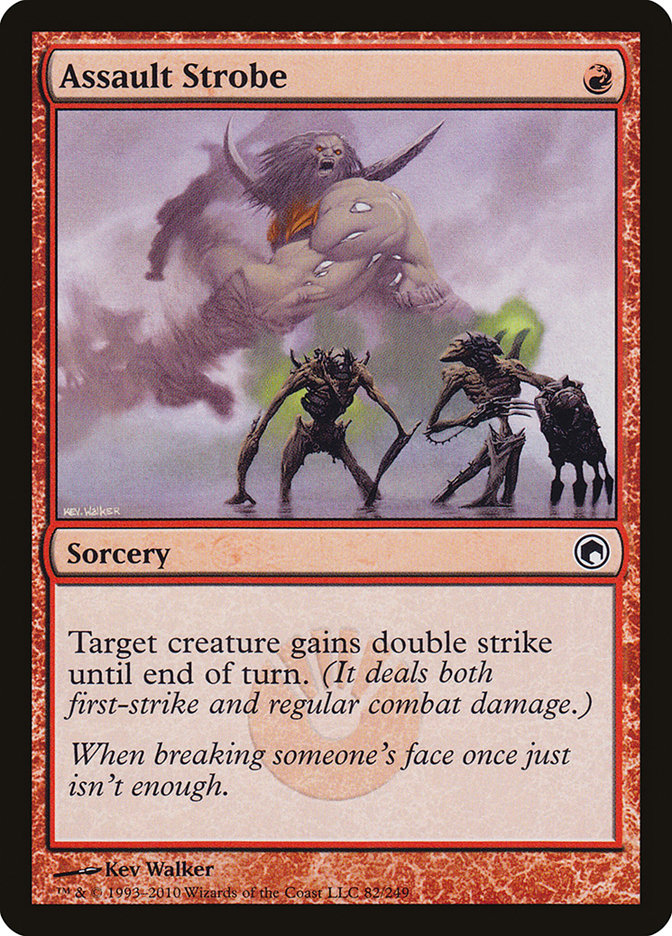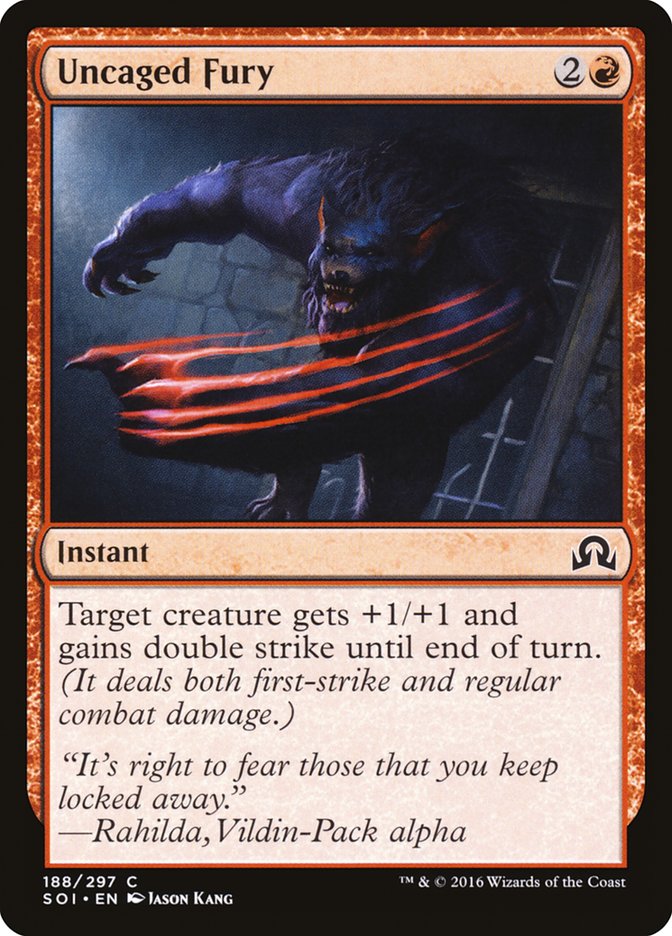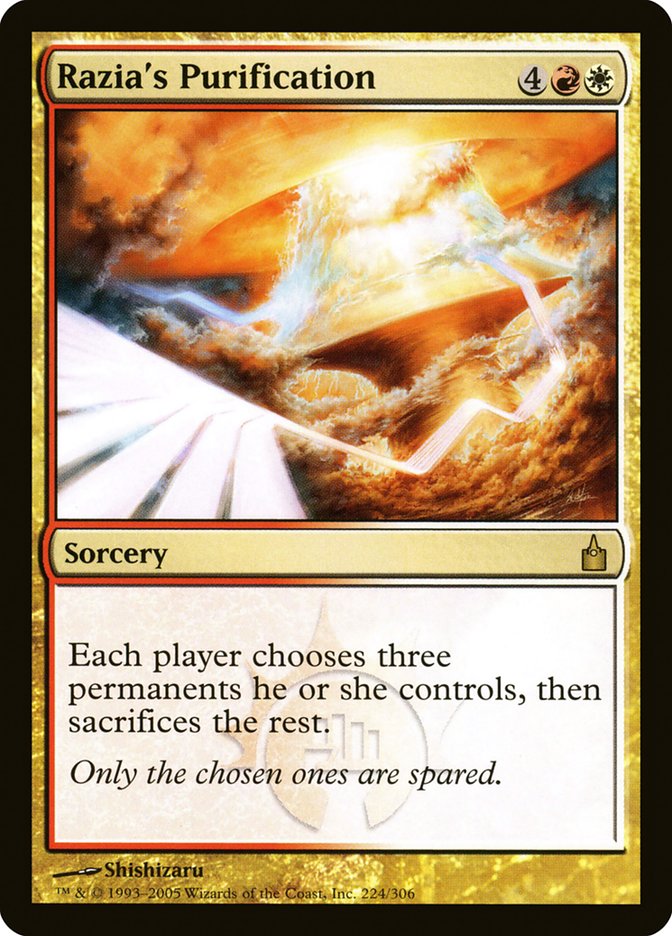Onward // Victory MTG Card
| Card sets | Released in 2 setsSee all |
| Mana cost | |
| Converted mana cost | 6 |
| Rarity | Uncommon |
| Type | Sorcery |
| Abilities | Aftermath |
Text of card
Aftermath (Cast this spell only from your graveyard. Then exile it.) Target creature gains double strike until end of turn.
Cards like Onward // Victory
The card Onward // Victory provides strategic depth for players crafting their decks in Magic: The Gathering. This split card enables creatures to pack a more powerful punch, with Onward doubling a creature’s power for the turn, similar to the way cards like Brute Strength increase a creature’s power and toughness. However, Victory sets itself apart as giving a creature double strike until end of turn, similar to the effects of cards like Assault Strobe.
Comparing Onward // Victory with another spell, Uncaged Fury, reveals a similar goal of increasing creature damage output. Uncaged Fury provides a creature with both a power boost and double strike, which is somewhat akin to casting both sides of Onward // Victory on one creature. Although Uncaged Fury achieves this effect with a single card, Onward // Victory offers flexibility, allowing you to selectively apply the power-doubling or double strike effect when it’s most tactical.
Assessing the card’s dual nature alongside similar cards, Onward // Victory showcases distinct advantages. It presents varied strategic options to players aiming for an opportunistic win condition within the diverse landscape of Magic: The Gathering strategies.
Cards similar to Onward // Victory by color, type and mana cost
Card Pros
Card Advantage: Onward // Victory is a versatile card that offers a significant shift in the balance of a game. When you cast Victory, it grants a creature double its power permanently—a potent increase that can lead to greater damage against opponents and often guarantees a stronger board presence. This means more pressure on the opponent, forcing them to answer or risk losing the game.
Resource Acceleration: Although Onward // Victory doesn’t directly generate mana or tokens, it can be considered a form of resource acceleration in the sense that it drastically increases the damage potential of your existing creatures. By doubling a creature’s power, it accelerates the rate at which you can deplete an opponent’s life total or take down larger threats, which is invaluable in the race for victory.
Instant Speed: The dual nature of Onward // Victory allows both halves to be cast at instant speed. This is a considerable advantage, as it enables you to surprise an opponent during combat or at the end of their turn, potentially turning the tide of battle in your favor without telegraphing your strategy or committing resources prematurely.
Card Cons
Discard Requirement: Onward // Victory necessitates a player to discard a card to harness its full potential. Choosing which card to discard can be taxing, particularly when your hand is already sparse.
Specific Mana Cost: The success of utilizing Onward // Victory hinges on the availability of both red and white mana sources. Decks that don’t run these colors will be unable to tap into the card’s strength, making it a less versatile option.
Comparatively High Mana Cost: With both halves of the card combined, the total mana investment is significant. Players might find other options that deliver similar or greater impact for less mana, thus optimizing their gameplay efficiency.
Reasons to Include in Your Collection
Versatility: Onward // Victory is flexible enough to fit into numerous deck archetypes. Its ability to boost a creature’s power significantly can turn any unassuming creature into a game-ending threat.
Combo Potential: The combination of Onward with creatures that have double strike or trample can lead to massive damage, paving the way for unsuspected wins. It’s a powerful addition to decks that aim to exploit such synergies.
Meta-Relevance: With decks focused on midrange battles and creature-based strategies, Onward // Victory offers a decisive edge. It’s critical in matches where a single combat phase can determine the victor, making it a relevant choice for the current competitive landscape.
How to beat
Onward // Victory presents itself as a formidable card in the MTG arsenal, offering a unique boost by doubling a creature’s power for the turn with its first half, Onward, and potentially giving it a winning strike with the second half, Victory, which allows the creature to gain lifelink. However, every card has its Achilles’ heel.
One strategy to counter Onward // Victory is the timely use of removal spells. Cards like Fatal Push or Path to Exile can effectively remove a creature from the battlefield before Onward // Victory can be cast, or in response to the spell, nullifying its effect and wasting the opponent’s resources. Another effective approach is to employ counter spells. Spell Pierce or Negate can stop Onward // Victory before it ever becomes a threat, preserving the balance of the game and putting the momentum back in your favor.
Maintaining a vigilant board presence with creatures that can block effectively or using instant-speed board wipes like Settle the Wreckage can also mitigate the impact of an enhanced creature’s assault. In conclusion, while Onward // Victory can be a game changer, it’s not unbeatable. Smart removal, counters, and defensive strategies can ensure your triumph over this powerful card.
Where to buy
If you're looking to purchase Onward // Victory MTG card by a specific set like Amonkhet and Amonkhet Remastered, there are several reliable options to consider. One of the primary sources is your local game store, where you can often find booster packs, individual cards, and preconstructed decks from current and some past sets. They often offer the added benefit of a community where you can trade with other players.
For a broader inventory, particularly of older sets, online marketplaces like TCGPlayer, Card Kingdom and Card Market offer extensive selections and allow you to search for cards from specific sets. Larger e-commerce platforms like eBay and Amazon also have listings from various sellers, which can be a good place to look for sealed product and rare finds.
Additionally, Magic’s official site often has a store locator and retailer lists for finding Wizards of the Coast licensed products. Remember to check for authenticity and the condition of the cards when purchasing, especially from individual sellers on larger marketplaces.
Below is a list of some store websites where you can buy the Onward // Victory and other MTG cards:
 BUY NOW
BUY NOW BurnMana is an official partner of TCGPlayer
- eBay
- Card Kingdom
- Card Market
- Star City Games
- CoolStuffInc
- MTG Mint Card
- Hareruya
- Troll and Toad
- ABU Games
- Card Hoarder Magic Online
- MTGO Traders Magic Online
See MTG Products
Printings
The Onward // Victory Magic the Gathering card was released in 2 different sets between 2017-04-28 and 2020-08-13. Illustrated by Grzegorz Rutkowski.
| # | Released | Name | Code | Symbol | Number | Frame | Layout | Border | Artist |
|---|---|---|---|---|---|---|---|---|---|
| 1 | 2017-04-28 | Amonkhet | AKH | 218 | 2015 | Aftermath | Black | Grzegorz Rutkowski | |
| 2 | 2020-08-13 | Amonkhet Remastered | AKR | 250 | 2015 | Aftermath | Black | Grzegorz Rutkowski |
Legalities
Magic the Gathering formats where Onward // Victory has restrictions
| Format | Legality |
|---|---|
| Historicbrawl | Legal |
| Commander | Legal |
| Historic | Legal |
| Legacy | Legal |
| Modern | Legal |
| Oathbreaker | Legal |
| Vintage | Legal |
| Duel | Legal |
| Explorer | Legal |
| Gladiator | Legal |
| Pioneer | Legal |
| Timeless | Legal |
Rules and information
The reference guide for Magic: The Gathering Onward // Victory card rulings provides official rulings, any errata issued, as well as a record of all the functional modifications that have occurred.
| Date | Text |
|---|---|
| 2017-04-18 | A spell with aftermath cast from a graveyard will always be exiled afterward, whether it resolves, it’s countered, or it leaves the stack in some other way. |
| 2017-04-18 | All split cards have two card faces on a single card, and you put a split card onto the stack with only the half you’re casting. The characteristics of the half of the card you didn’t cast are ignored while the spell is on the stack. For example, if an effect prevents you from casting green spells, you can cast Destined of Destined // Lead, but not Lead. |
| 2017-04-18 | Each split card has two names. If an effect instructs you to choose a card name, you may choose one, but not both. |
| 2017-04-18 | Each split card is a single card. For example, if you discard one, you’ve discarded one card, not two. If an effect counts the number of instant and sorcery cards in your graveyard, Destined // Lead counts once, not twice. |
| 2017-04-18 | If another effect allows you to cast a split card with aftermath from a graveyard, you may cast either half. If you cast the half that has aftermath, you’ll exile the card if it would leave the stack. |
| 2017-04-18 | If another effect allows you to cast a split card with aftermath from any zone other than a graveyard, you can’t cast the half with aftermath. |
| 2017-04-18 | If you cast the first half of a split card with aftermath during your turn, you’ll have priority immediately after it resolves. You can cast the half with aftermath from your graveyard before any player can take any other action if it’s legal for you to do so. |
| 2017-04-18 | Split cards with aftermath have a new frame treatment—the half you can cast from your hand is oriented the same as other cards you’d cast from your hand, while the half you can cast from your graveyard is a traditional split card half. This frame treatment is for your convenience and has no rules significance. |
| 2017-04-18 | The value of X is determined only as Onward resolves. It won’t change later in the turn if other effects modify the creature’s power. |
| 2017-04-18 | While not on the stack, the characteristics of a split card are the combination of its two halves. For example, Destined // Lead is a green and black card, it is both an instant card and a sorcery card, and its converted mana cost is 6. This means that if an effect allows you to cast a card with converted mana cost 2 from your hand, you can’t cast Destined. This is a change from the previous rules for split cards. |
| 2017-07-14 | Once you’ve started to cast a spell with aftermath from your graveyard, the card is immediately moved to the stack. Opponents can’t try to stop the ability by exiling the card with an effect such as that of Crook of Condemnation. |
